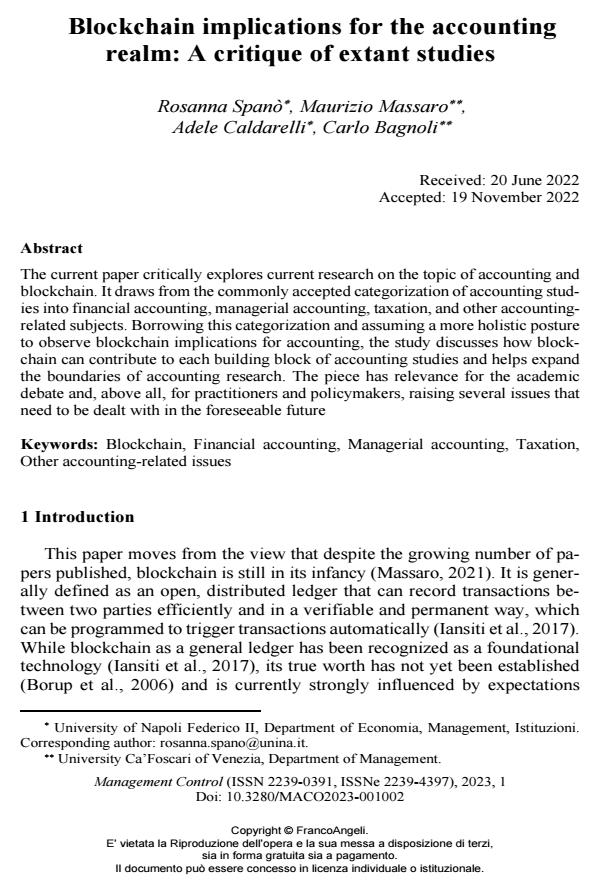Blockchain implications for the accounting realm: A critique of extant studies
Titolo Rivista MANAGEMENT CONTROL
Autori/Curatori Rosanna Spanò, Maurizio Massaro, Adele Caldarelli, Carlo Bagnoli
Anno di pubblicazione 2023 Fascicolo 2023/1
Lingua Inglese Numero pagine 22 P. 21-42 Dimensione file 255 KB
DOI 10.3280/MACO2023-001002
Il DOI è il codice a barre della proprietà intellettuale: per saperne di più
clicca qui
Qui sotto puoi vedere in anteprima la prima pagina di questo articolo.
Se questo articolo ti interessa, lo puoi acquistare (e scaricare in formato pdf) seguendo le facili indicazioni per acquistare il download credit. Acquista Download Credits per scaricare questo Articolo in formato PDF

FrancoAngeli è membro della Publishers International Linking Association, Inc (PILA), associazione indipendente e non profit per facilitare (attraverso i servizi tecnologici implementati da CrossRef.org) l’accesso degli studiosi ai contenuti digitali nelle pubblicazioni professionali e scientifiche.
The current paper critically explores current research on the topic of accounting and blockchain. It draws from the commonly accepted categorization of account-ing studies into financial accounting, managerial accounting, taxation, and other accounting-related subjects. Borrowing this categorization and assuming a more holistic posture to observe blockchain implications for accounting, the study dis-cusses how blockchain can contribute to each building block of accounting studies and helps expand the boundaries of accounting research. The piece has relevance for the academic debate and, above all, for practitioners and policymakers, raising several issues that need to be dealt with in the foreseeable future
Parole chiave:Blockchain, Financial accounting, Managerial accounting, Taxation, Other accounting-related issues
- Understanding the Financial Transaction Security through Blockchain and Machine Learning for Fraud Detection in Data Privacy and Security Seaam Bin Masud, Md Masud Rana, Hossain Jaman Sohag, Fisan Shikder, Mahfujur Rahman Faraji, Md Mahadi Hasan, in SSRN Electronic Journal /2025
DOI: 10.2139/ssrn.5164958 - Il contributo di Management Control alla ricerca su tecnologie digitali e sostenibilità Daniela Mancini, Domenica Lavorato, Palmira Piedepalumbo, in MANAGEMENT CONTROL 2/2023 pp.5
DOI: 10.3280/MACO2023-002001 - Art, Culture and Made in Italy Palmira Piedepalumbo, pp.315 (ISBN:978-3-032-12527-9)
Rosanna Spanò, Maurizio Massaro, Adele Caldarelli, Carlo Bagnoli, Blockchain implications for the accounting realm: A critique of extant studies in "MANAGEMENT CONTROL" 1/2023, pp 21-42, DOI: 10.3280/MACO2023-001002